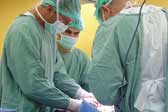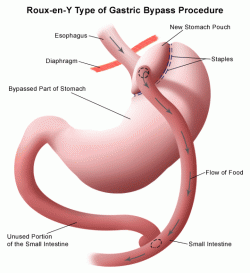 Gastric bypass surgery is a major decision. It is important to understand the qualification process, risks and benefits, how it will be performed, and what to expect. Gastric bypass surgery is not for everyone. The candidate must have tried to lose weight by diet and exercise prior to considering bypass surgery. Typically, the primary requirements are: 1. body mass index (BMI) of 40 or higher, 2. BMI of 35-39 with a health related condition such as diabetes or high blood pressure.
Gastric bypass surgery is a major decision. It is important to understand the qualification process, risks and benefits, how it will be performed, and what to expect. Gastric bypass surgery is not for everyone. The candidate must have tried to lose weight by diet and exercise prior to considering bypass surgery. Typically, the primary requirements are: 1. body mass index (BMI) of 40 or higher, 2. BMI of 35-39 with a health related condition such as diabetes or high blood pressure.
The candidate must also go through a medical screening process by a professional team of medical advisors. The purpose of the screening process is to determine if the candidate is psychologically and medically stable for the procedure. Once the candidate has been selected for bypass surgery they must prepare mentally and physically for the procedure. In order to ensure success of the bypas surgery lifestyle changes will need to be made considering the risk of the procedure. Prior to the procedure the candidate will be asked to committ to food and diet restrictions and an exercise regimen according to the physician.
Types of Surgery
 There are two types of bypass surgery: Roux en Y – the stomach is cut and stapled into a pouch (about the size of a walnut that only holds about an oz. of food) that is directly routed to the small intestine. The second type of bypass surgery is Biliopancreatic diversion with duodenal switch – 80% of the upper stomach is removed and a thin section of the stomach (which is already connected to the small intestine) remains. As with any surgery there are always risks. Risks include: vitamin deficiency, kidney stones, bleeding ulcers, infection, blood clots, pneumonia, dumping syndrome, leaking of the staples, many others, and including death.
There are two types of bypass surgery: Roux en Y – the stomach is cut and stapled into a pouch (about the size of a walnut that only holds about an oz. of food) that is directly routed to the small intestine. The second type of bypass surgery is Biliopancreatic diversion with duodenal switch – 80% of the upper stomach is removed and a thin section of the stomach (which is already connected to the small intestine) remains. As with any surgery there are always risks. Risks include: vitamin deficiency, kidney stones, bleeding ulcers, infection, blood clots, pneumonia, dumping syndrome, leaking of the staples, many others, and including death.
Once the procedure is complete you will follow a gastric bypass diet which water and clear liquids are given in moderation. In the initial time following the procedure the candidate may be asked to stick with a water diet and gradually increase intake as tolerated. Intake will increase from water and clear liquids to soft, high protein food. The increase will need to happen gradually keeping in mind the stomach will need plenty of time to stretch some. Initially, there may be an intolerance to foods so dehydration and vitamin deficieny are a great risk.
Benefits And Side Effects
At first, there may be side effects such as vomitting and diarrhea. The pros of the surgery are great including a significant reduction or even elimination of health conditions like diabetes, high blood pressure, and cholesterol. It is very important to adhere to the medical instructions given by the doctor to ensure complete success of the surgery.

